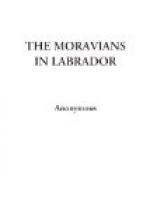Ever since the brethren had been in Labrador, they had heard the Esquimaux speak of Indians in the interior, of whom they seemed greatly afraid; frequently a sudden terror would be diffused among their tribes, if they discovered any trace of that formidable people near them. But in the summer of 1798, they were alarmed with the certain intelligence that five or six of their families had arrived at a European settlement, at Kippakak, about five or six miles distant from Hopedale; and in April 1799, some of them for the first time paid the mission-station a visit. They were a father and son, who came with the design of buying tobacco from the brethren. They lived with some Christians of French extraction in the southern settlements, and had been baptized by a French priest. All the Esquimaux immediately gathered round the strangers, and eyed them as objects of jealous curiosity. The old man appeared exceedingly alarmed at this, and was extremely glad when the brethren invited him and his son into the mission-house. The latter understood the Esquimaux language and English; but the father, when any one wished to speak with him, pointed to his ears, giving them to understand that he could hear nothing. When food was placed before them they took off their caps and crossed themselves; and before they went to bed they kneeled down and repeated a long prayer.
An Esquimaux wished them to lodge in his house, but when they came to the door they would not enter; the old man began to tremble, and made signs that they would rather sleep in the bushes. As the brethren tried to quiet them, the son cried out in the Esquimaux language, “They are so filthy,” and added in English, “We cannot sleep with the Esquimaux, nor eat out of their dirty vessels. We have been accustomed to live as cleanly as the Europeans.” The brethren, who saw that they were afraid of the great number of the Esquimaux, but wished to conceal their terror under the pretence of disgust at their filthiness, showed them into one of their own workshops, where beds were quickly prepared.




